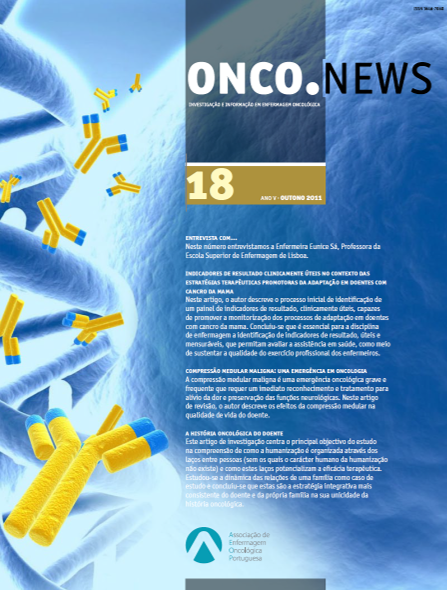The patient's oncological history
DOI:
https://doi.org/10.31877/on.2011.18.03Keywords:
cancer, oncological story, links between people, family, hospital, radiotherapy, nursingAbstract
The experience of cancer is particularly marked by a dense therapeutic itinerary, scheduled, of sucessive treatment steps, crossing a variety of clinical settings and with a diachronic nature. Current concepts on hospital humanization emphasize the positive contribution of family ties in the treatment and in their own re-conceptualization of a hospital. The ties between patients themselves and their affective relationships are, actually, transformed during an oncological history.
The main objective of this paper is to understand how the humanization is constituted by the ties between people (without which the human character of humanization does not exist) and how these ties potentiate the therapeutic efficacy, including how the relationship with the hospital can qualify their own family, in a shared oncological story where all family members have a role. For this, we observed the dynamics of family relations as a case-study and concluded that the way these ties are qualified is what gives meaning to the oncological history and that ties are the most consistent integrative strategy for both patients and their own family in their own oncological history.
Downloads
References
Ferreira, M. F. A. M. (2008). “Cuidar no domicílio: sobrecarga da família/cuidador principal com doente oncológico paliativo”. Tese
de mestrado em Oncologia. Instituto de Ciências Biomédicas de Abel Salazar da Universidade do Porto, Porto
Figueiredo, A. P. R. S. (2007). Impacto do tratamento do cancro colorrectal no doente e cônjuge: implicações na qualidade de vida,
morbilidade psicológica, representações de doença e stress pós-traumátic. Tese de mestrado. Instituto de Educação e Psicologia da Universidade do Minho, Braga
Kolesnicov, P. (2004). Biografia do meu cancro. Editorial Caminho, S.A. Lisboa
Lothian, N. (2002). The lived experience of being diagnosed with a life threatening form of cancer: Tese de doutoramento em Ciências
da Saúde, Auckland University of Technology
Martinéz, A. A. R., Pérez-Vasquez, A., Villabona, S. M. G., Cruz, M. C. F. (2007) Escala de Zarit reducida para la sobrecarga del cuidador en atención primaria. Atención Primaria, 39(4), 185-188
Pais, A. (2009). Viver… depois do cancro. Revista Info, 16, 12-17
Pereira, M. G., Lopes, C. (2002). O Doente Oncológico e sua Família. Lisboa. Climepsi Editores
Salgado, N. F. O. G. (2010). A radioterapia na história oncológica do doente: Tese de mestrado mestrado em Sociopsicologia da Saúde. Instituto Superior Miguel Torga, Coimbra
Wright. L. M.; Leahey, M. (2002) Enfermeiras e famílias: um guia para avaliação e intervenção na família. Editora Roca. São Paulo.
Downloads
Published
How to Cite
Issue
Section
License
Copyright (c) 2023 Nuno Filipe de Oliveira Gil Salgado

This work is licensed under a Creative Commons Attribution-NonCommercial-ShareAlike 4.0 International License.




